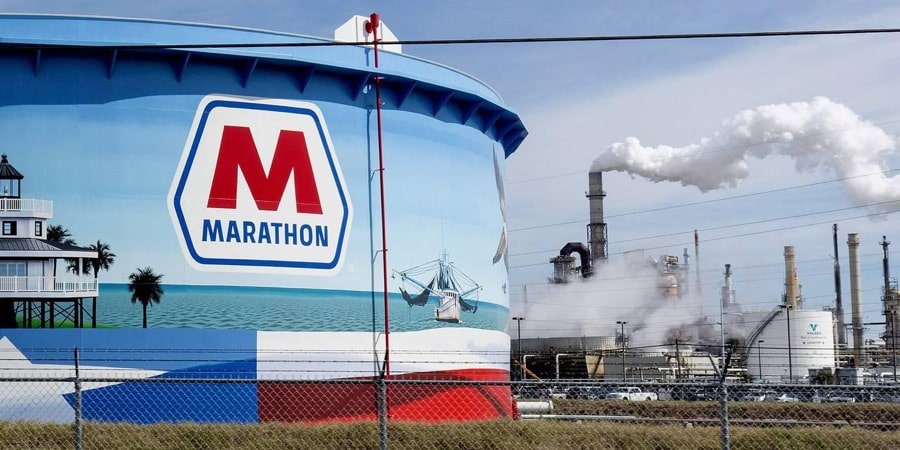After sitting mostly idle since late 2020, Marathon Petroleum’s refinery plans to fire up again soon — but this time to produce liquid biofuels instead of gasoline.
It’s a shift the company is framing as a green-friendly alternative, but one environmentalists say will dirty up the skies again.

The Contra Costa County Planning Commission has approved Marathon’s use permit request to upgrade its Martinez plant so it can process vegetable oils and animal fats into renewable diesel, propane and other fuels.
For decades, the refinery produced diesel from crude oil and other fossil fuels — a process that pollutes the skies and has been decried as a contributor to climate change. Two years ago, it produced 18 percent of all fossil-fuel diesel consumed in California, according to Marathon representatives.
The refinery began pausing operations in April 2020 just as the pandemic forced the nation into a lockdown and people cut their driving drastically. Plummeting gas sales led to more than 700 layoffs, and growing pressure from local politicians and environmental groups to abandon fossil fuels prompted company officials to consider an operational transition to biofuels production.
With that transition in sight, the company now expects to hire as many as 1,400 workers during construction of a new plant and eventually employ 110 full-time workers to run the biofuels facility around the clock.
The move pleased the county’s planning commissioners.
“I think it puts us in the realm of doing things cleaner, better,” commissioner Kevin Van Buskirk said, adding that he hoped the county “would be the leaders of something positive for the environment and for people’s health.”
Even so, the project’s own environmental impact report points out there’ll be some unavoidable negative impacts, such as significant carbon emissions and odours created by the new facility’s construction.
That’s not all, environmental advocates and experts pointed out during the meeting. Studies show that biofuel production — with its reliance on vast amounts of vegetation and animal fats — often worsens food shortages, inflates crop prices, and leads to more deforestation, they said.
Taking those factors into account, some environmental experts argue that biofuel doesn’t lower carbon emissions significantly more overall than refining crude oil, even if the facility itself emits fewer pollutants.
“The carbon intensity — once you take into account the lifecycle of the fuels and not just the throughput at this one particular place — is very likely to be greater,” said Kathleen McAphee, a professor of international relations and environmental policy at San Francisco State University.
Theo LeQuesne of the Center for Biological Diversity said the project’s final environmental impact report didn’t adequately address how biofuels may impact net carbon emissions, odor levels or the strain on food systems.
“A more appropriate solution, however, would be for the county to develop a plan to decommission the refinery and facilitate an equitable transition to an energy system that protects workers without costing the health and well-being of frontline communities in California and beyond,” LeQuesne said.
Marathon’s plan received support from some East Bay union officials who said they were thrilled refineries could change their operations while producing new jobs.
Ken Miller, a business agent for the Iron Workers 378, said it would be a “fantasy” to expect oil refineries to immediately switch to perfectly renewable energy solutions.
“This is an excellent starting point for change in how the world is powered,” Miller said. “I believe construction should start tomorrow.
“To think we could shut it all down tomorrow and switch to electric is a fantasy,” Miller added. “The technology is there, but the infrastructure is not.”
Planning commissioners concurred, saying the shift to biofuels is a workable compromise.
“If this project isn’t approved, then Marathon’s probably going to come back to the table and say, ‘Well fine, we’ll just keep refining petroleum-based fuels and keep outputting gasoline, diesel and jet fuel like we did in years past’,” commissioner Ross Hillesheim said.
For more information visit www.marathonpetroleum.com

















